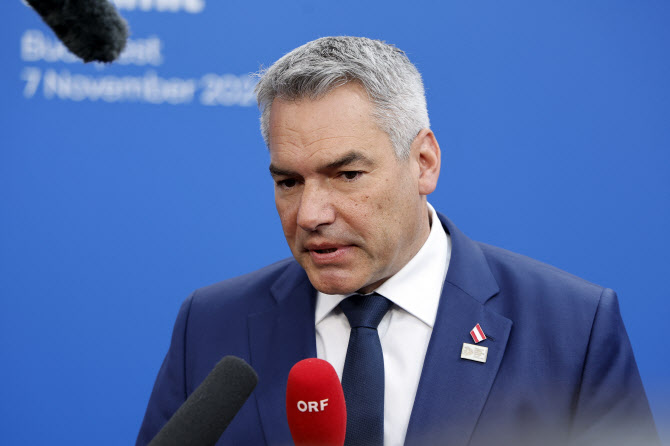Breakdown of coalition talks leads to resignation
Ideological differences between parties likely unresolved
FT: “Uncertainty deepens amidst economic recession threats” ‘[Edaily, Kim Yoonji] On the 4th (local time), Austrian Chancellor Karl Nehammer announced his resignation. This comes after coalition talks between the People’s Party and the Social Democratic Party broke down on the same day. ‘,
,
,
|
, ‘On this day, Chancellor Nehammer stated, “Regrettably, today’s negotiations have broken down, and the People’s Party will not continue the talks,” adding, “I will soon step down from the chancellorship and as the leader of the People’s Party to enable an orderly transfer of power.”’,
,
, ‘Chancellor Nehammer further explained that “the ‘destructive forces’ of the Social Democrats have prevailed in the negotiations” and that “the People’s Party has no intention of signing the economic policies proposed by the Social Democrats.”’,
,
, ‘In last September’s elections, Austria’s far-right Freedom Party, which is anti-immigration and pro-Russia, won first place but failed to secure a majority. Major parties refused to cooperate with the Freedom Party, resulting in a coalition attempt by the center-right People’s Party, the center-left Social Democratic Party, and the progressive Neos.’,
,
, ‘However, on the 3rd, the Neos announced they were suspending the coalition talks, and the negotiations between the People’s Party and the Social Democratic Party also broke down the next day. The ideological differences between the parties could not be overcome. Andreas Babler, the leader of the Social Democrats, expressed regret over the People’s Party’s decision, stating, “This is not a good decision for Austria, and the Social Democrats are willing to compromise.”’,
,
, ‘The Financial Times of the UK has pointed out that Austria’s economic uncertainty is deepening as the country faces the threat of a three-year economic recession. ‘,
,
, ‘With Chancellor Nehammer’s resignation, there is speculation that the Freedom Party might attempt to form a coalition or that early elections could be held. Polls suggest that the Freedom Party’s support significantly surpasses that of the People’s Party and the Social Democrats, potentially giving it more strength than in last September’s elections.’,
,
, ‘The Freedom Party has consistently criticized the coalition attempt by the three parties excluding it, likening it to Germany’s recently collapsed “traffic light coalition.” Herbert Kickl, the leader of the Freedom Party, stated, “They have failed,” and asserted that Austrian President Alexander Van der Bellen, who oversaw the formation of the next government, bears considerable responsibility for this turmoil.’,
,
, ‘Reuters reported that the failure of coalition talks within approximately three months of the September elections indicates that forming stable governments is becoming increasingly difficult in European countries. In France, the government led by Prime Minister Michel Barnier dissolved after a successful no-confidence vote in the lower house last month, while Germany is set to hold early elections on the 23rd of next month after the collapse of Chancellor Olaf Scholz’s “traffic light coalition.”’,
,
,


